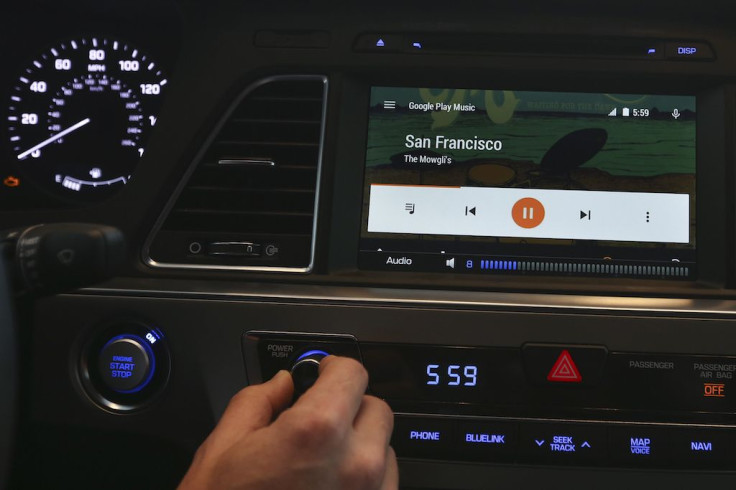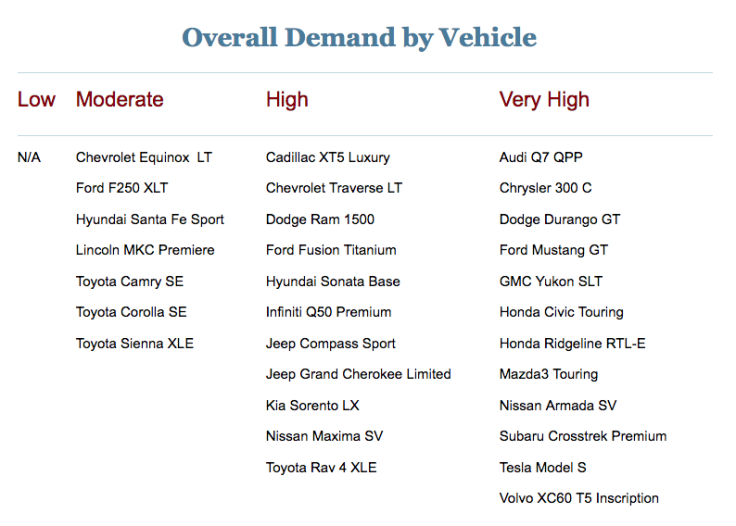AAA Study: Distracting Dashboard Gadgets, GPS Increase Car Accidents

When picking out a car to buy, consumers might be looking into whether the vehicle includes the latest technology, like calling texting and fancy dashboards, but those features could increase the risk of getting into a car accident, researchers found.
Researchers from the University of Utah conducted a study for the AAA on how distracting infotainment vehicle systems are.
Experts looked at 30 systems in new 2017 cars. None of the systems required a low level of demand on drivers, while seven of them generated a moderate demand, 11 required high demand levels and 12 very high.
The AAA broke down the demand levels by type of car:

“Manufacturers need to be more selective with what they put in cars. Safety should be prioritized over features that do not function,” the study’s co-author, Dr. Joel Cooper told International Business Times. “Technology in vehicles is not inherently a bad thing but technology that is irrelevant to driving and does not function well is a huge safety concern. If a new technology is not safer than the one it replaces then we are moving in the wrong direction.”
The study looked at visual and cognitive demand and how long drivers took to complete a task. Participants in the study, whose ages ranged from 21-36, were told to use voice commands, touch screens, make calls and send texts, change radio stations or program navigation while driving.
Using the GPS was the most distracting task and texting while driving followed. Just listening to the radio was distracting at some level. In the study, participants were swerving completely out of their lanes, failed to halt at stop signs and drove way under the speed limit, Cooper said.
Did you know: Some new in-vehicle technology can distract you while driving? Learn more: https://t.co/iWzMC1XiXe #AAA #Drivesafe pic.twitter.com/o5UQI8hZZ9
— AAA (@AAAnews) October 5, 2017
Drivers using technologies were visually and mentally distracted for more than 40 seconds when using a GPS or sending a text. The amount of time is dangerously high, since previous research has said taking eyes off the road for just two seconds can double the risk for a crash. One in three Americans use infotainment systems while driving, which leads to a lot of time and eyes off U.S. roads.
While people may need to take their eyes off the road for some tasks, some might argue that they don’t look down often because they use voice control technology. However, using voice control is still dangerous, since drivers may have to look at the screen to make sure the voice assistant heard commands correctly.
“Even perfect systems with nothing to look at result in a diversion of attention from the forward roadway,” said Cooper. “We often see participants fail to see objects that are right in front of them when they are using voice commands. Voice systems direct attention internally and as a result, drivers can still fail to see things, even if they are apparently looking right at them. They just don't respond.”
The AAA reminds consumers that just because a car is equipped with technology, that doesn’t mean it’s safe to use while on the road.
“Some of the latest systems on the market now include functions unrelated to the core task of driving like sending text messages, checking social media or surfing the web — tasks we have no business doing behind the wheel,” Marshall Doney, AAA’s president and CEO, said in a statement. “Automakers should aim to reduce distractions by designing systems that are no more visually or mentally demanding than listening to the radio or an audiobook. And drivers should avoid the temptation to engage with these technologies, especially for non-driving tasks.”
Cooper said functions in modern car systems supported tasks that are way off what drivers should need help with when on the road.
“We were the most surprised by just how much there is in modern cars and how little is restricted from use while the vehicle is in motion,” Cooper told IBTimes. “We had cars that supported finger painting on the screen while driving, updating social media, sending texts, etc. What's worse, the user experience for most tasks is so bad that even the simplest tasks now require a multi-step processes to complete.”
Cooper recommends drivers shouldn’t assume that just because a car comes with certain technology that it has been deemed safe to use while on the road, adding that they technology has not been fully tested for use while driving.
Experts alse pointed out the complexity of technologies in cars, which includes numerous functions on the wheel besides a complicated dashboard. An AAA survey found 70 percent of U.S. adults said they want new technology in their car, but only 24 percent said they felt the technology already worked perfectly.
“When an in-vehicle technology is not properly designed, simple tasks for drivers can become complicated and require more effort from drivers to complete,” Dr. David Yang, executive director of the AAA Foundation for Traffic Safety, said in a statement.
© Copyright IBTimes 2024. All rights reserved.





















